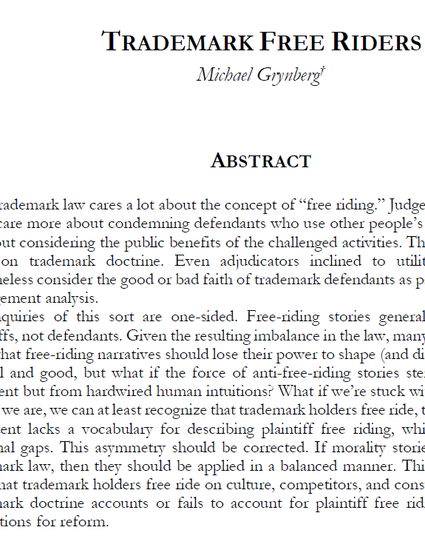
Article
Trademark Free Riders
Berkeley Technology Law Journal
(2024)
Abstract
Trademark law cares a lot about the concept of “free riding.” Judges prone to moralizing often care more about condemning defendants who use other people’s trademarks than they do about considering the public benefits of the challenged activities. This intuition has left its mark on trademark doctrine. Even adjudicators inclined to utilitarian thinking must nonetheless consider the good or bad faith of trademark defendants as part of basic trademark infringement analysis.
Inquiries of this sort are one-sided and generally benefit trademark plaintiffs. Given the resulting imbalance in the law, many trademark reformers argue that anti-free-riding stories should lose their power to shape (and distort) doctrine. That’s all well and good, but what if the force of anti-free-riding narratives stems not from rational argument but from hardwired human intuitions? What if we’re stuck with them?
If we are, we can at least recognize a simple truth: Trademark holders free ride, too. As it is, trademark precedent lacks a vocabulary for describing plaintiff free riding. This asymmetry creates important doctrinal gaps and needs correction. If morality stories are to be a part of trademark law, then they should be applied in a balanced manner. This article explores the ways that trademark holders free ride on culture, competitors, and consumers; describes how trademark doctrine accounts or fails to account for plaintiff free riding; and offers some suggestions for reform.
Keywords
- trademark law,
- trademarks,
- intellectual property
Disciplines
Publication Date
Spring 2024
DOI
https://dx.doi.org/10.2139/ssrn.4314756
Citation Information
Michael Grynberg. "Trademark Free Riders" Berkeley Technology Law Journal Vol. 39 Iss. 1 (2024) p. 275 - 344 ISSN: 10863818 Available at: http://works.bepress.com/michael-grynberg/14/
